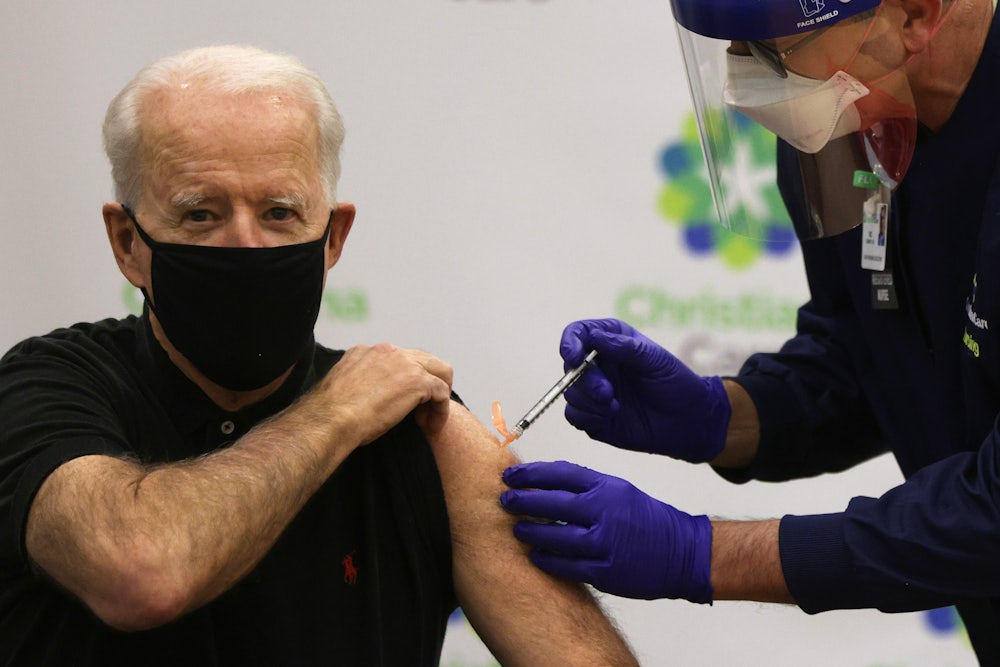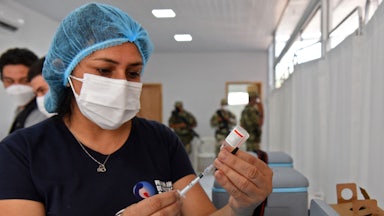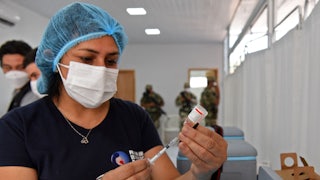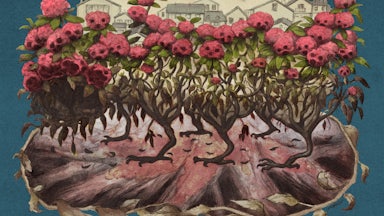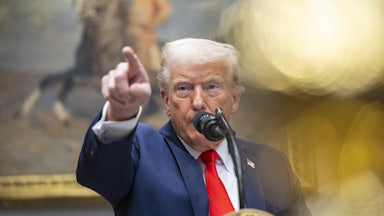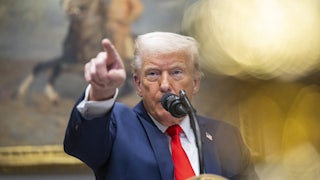As members of the World Trade Organization meet Friday afternoon, countless residents of the United States, United Kingdom, the European Union, and other wealthy regions will be getting their second Covid-19 vaccine, as Covid cases in these places decline. Thousands in India, where 60 percent of the world’s vaccines are made, will be dying.
Moving into the deadliest phase of the coronavirus pandemic, support for temporarily waiving intellectual property rights for Covid-19 vaccines and related products has been swelling. Former world leaders, Nobel laureates, medical professionals, legislators, faith leaders, and more than 100 countries have given public support for the initiative led by South Africa and India at the WTO, whose Trade-Related Aspects of Intellectual Property Rights, or TRIPS, council is meeting Friday to discuss Covid-19. Millions of people, in countries both supporting and blocking the waiver, have mobilized in support of the initiative, affirming that no one is safe until everyone is safe.
Vaccine inequality has been the biggest failing of the global pandemic response. At the beginning of the pandemic, world leaders lined up to commit to cooperation and solidarity, but this rhetoric quickly unraveled as governments prioritized national efforts—hoarding more vaccines than they need and initiating export controls to keep goods within their territories. Given domestic pressures to get “back to normal,” this is somewhat understandable, but there is no such thing as a competitive advantage in a global pandemic, and now the same countries that cornered the vaccine market for their own populations are blocking an initiative to unleash production.
The logic behind calls for the waiver is clear: As long as we do not take steps to rapidly increase vaccine production, we will continue to play catchup with a virus that has demonstrated its capacity to mutate quickly into more aggressive and resistant strains. Producing vaccines to scale, quickly and without affordability barriers, is the only solution. The intellectual property regime is a huge barrier to this task, preventing manufacturing outside the licensing agreements overseen by the owners of the Covid-19 vaccine patents. The patents, and the multilateral agreements enforcing them, protect the profits of pharmaceutical giants at the expense of a global effort to end the pandemic: While one in four citizens of rich nations have had a vaccine, just one in 500 people in poorer countries have. That’s a moral crisis. And it’s also an epidemiological one.
Since the proposal to temporarily waive certain provisions of the TRIPS Agreement was first presented to the TRIPS Council at the WTO last October, pharmaceutical companies and the countries blocking the waiver—the U.S., the U.K., the EU, Switzerland, Japan, Norway, Brazil, Singapore, and Australia—have offered a series of questionable justifications for their actions that allow the waiver to languish in diplomatic procedure while the pandemic rages on.
We have been told that production bottlenecks weren’t about intellectual property restrictions and that manufacturing capacity was maxed out. This has been proven wrong, as manufacturing facilities that could make hundreds of millions of doses on short notice have stated publicly that they are unable to do so without the blueprints and technical know-how.
We have been told that a waiver would undermine responses to future pandemics by compromising the innovation incentive that patents offer. This, too, has shown to be bogus, since existing vaccines relied on public backing to get their operations off the ground—indeed, the Oxford-AstraZeneca vaccine was around 97 to 99 percent funded by public money.
As others have pointed out, much of the industry’s innovation has been predicated on decades of public support for research and development. “Protecting” these patents means protecting companies’ ability to profit off research that taxpayers funded—another story of socializing risk and privatizing profits.
We have also been told by patent defenders (Bill Gates, for example) that expanding vaccine manufacturing by waiving patents is impossible because manufacturers in poorer countries aren’t careful enough or safe enough—even though some are already integrated into Covid-19 vaccine supply chains—and that building or upgrading manufacturing facilities could take too long. But counterexamples abound: At the start of the pandemic, the U.K. had only two plants making seasonal flu jabs and a Japanese encephalitis vaccine. With the help of public investment, it now has four facilities making Covid-19 vaccines with another two on track to be ready by the end of 2021. America’s own effort was able to scale up 23 manufacturing facilities within six months.
Blocking countries have argued that existing flexibilities in the WTO rules will be enough for poorer countries to make their own versions. It’s a justification that doesn’t make much sense. (Why block the waiver if the waiver won’t change anything?) But it’s also undercut by the fact that the pharmaceutical industry is already lobbying for countries pursuing these measures to face punitive sanctions—a tactic the U.S. has been only too willing to pursue in the past.
Now, in an act of desperation, the pharmaceutical giants are saying that protecting vaccine patents is a matter of security. On Sunday, the Financial Times reported that companies have “warned” White House officials in private meetings that waiving patent protections would give Chinese and Russian scientists access to technologies that could help them beat cancer and heart problems—as if that’s a bad thing. But from the corporate perspective, it is: Sharing these recipes means others might advance science, undercutting companies’ monopoly position.
Perhaps the saddest thing of all is that the states blocking the waiver don’t even own the patents: They enabled their development with public investment but have allowed private companies to retain all the rights while running roughshod over public health priorities. So why are richer governments going along with it? Are they betting—against the science—that ongoing Covid outbreaks won’t generate mutations that render existing vaccines useless? Do they believe that their border control will do the work of keeping the unvaccinated out—a profoundly racist prospect? Or are they so averse to opening up the intellectual property rights can of worms that they think it’s worth the millions who may die as a result?
Geopolitical vaccine games, in reality, are in nobody’s interest but the people who use their ownership of patents to extract rents, much like a slum landlord who buys up excess property during a crash and then extorts outsize profits from tenants. The countries now blocking the TRIPS waiver host the companies that have made the most from intellectual property receipts since 1997, when the TRIPS Agreement was introduced. These companies want to block potential competitors from arising in other regions of the world, and they have convinced the governments of the countries that host them to back this shortsighted strategy at the cost of countless lives. If this sounds uncomfortably neocolonial in its overtones, that’s because it is.
The Biden administration claims to want to rebuild faith in democracy and multilateralism. That stated goal is meaningless if the White House cannot get behind an initiative backed by the majority of countries in the world to challenge a pharmaceutical industry that spends around double what any other sector spends on lobbying in the U.S.
Pharmaceutical companies are projected to make nearly $40 billion in sales from Covid-19 vaccines in 2021. Pfizer has been accused of “bullying” Latin American governments in negotiations for vaccines, demanding that they put up sovereign assets as guarantees against any civil suits people who experience bad side effects might file. Poorer countries have been charged two to three times what wealthier countries are paying for the Oxford-AstraZeneca vaccine. The People’s Vaccine Alliance calculates that Pfizer, Johnson & Johnson, and AstraZeneca have paid out $26 billion in dividends and stock buybacks to their shareholders in the past 12 months—enough to pay to vaccinate at least 1.3 billion people, the equivalent of the population of Africa. And now this industry is throwing everything it has into lobbying Biden and other leaders to block the waiver.
The development of multiple viable vaccines to eradicate the Covid-19 pandemic in less than a year was an incredible scientific achievement that brought hope to the billions of people whose lives have been upended by the pandemic. Supporting the waiver would be an unprecedented achievement for a renewed multilateralism that puts people before profits. It would also be popular among citizens of blocking regions: Most people across the U.S., France, Germany, and the U.K. think that governments should ensure vaccine science and know-how is shared with manufacturers around the world rather than remaining the exclusive property of a handful of pharmaceutical giants.
During his presidential campaign, Biden committed to sharing Covid-19 vaccine technologies and ensuring patents do not stand in the way of other countries accessing life-saving vaccines if he was elected, calling it “the only humane thing in the world to do.” It is not too late to stay true to this promise and throw U.S. weight at the WTO behind a people’s vaccine.
